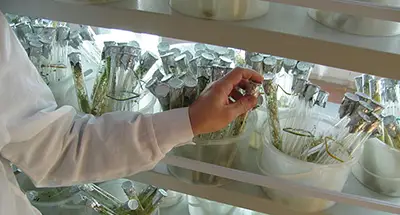Agricultural Biotechnology

Agrobiotechnology
Agrobiotechnology utilizes various techniques to enhance agricultural practices and crop yields. Genetic engineering, for instance, allows scientists to introduce desirable traits into crops, making them resistant to pests and diseases, tolerant to harsh environments, or even fortified with essential nutrients. Bt cotton, a pest-resistant variety, stands as a testament to this, reducing insecticide use and boosting farmer incomes. Similarly, drought-resistant rice varieties developed through gene editing offer hope for food security in water-scarce regions.
Agrobiotechnology Terms
Here are some of the terms that I discovered during my introduction to agricultural biotechnology.
Agricultural biotechnology is also known as agribiotechnology, agro-biotechnology agribiotech, agbiotech.
Agrobiotechnology is an umbrella term to describe different processes for duplicating biological material.
Agricultural biotechnology is also known as agribiotechnology, agro-biotechnology agribiotech, agbiotech.
GM - Genetically Modified
GMO - Genetically Modified Organism
GE - Genetically Engineered
LMO - Living Modified Organism
Transgenic - Containing genes from another species
Bt Crops - transgenic crops producing Bacillus thuringiensis (Bt) toxins that kill pests.
Bt - Bacillus thuringiensis (Bt) is a natural soil bacterium that produces crystals containing proteins that are toxic to certain insects.

Pros and Cons of Agricultural Biotechnology
Advances in agricultural biotechnology may provide farmers and consumers with:
Reduced use of pesticides
Crops resistant to disease
Crops resistant to pests
Increased yields
Reduced production costs
Foods that are nutritionally-enriched
Foods that last longer
Reduced fats
Reduced allergens/food-borne illnesses
New medicines
Reduced use of uncultivated land
Erosion, soil management
Renewable sources of energy
Biodegradable manufacturing materials
Risks of Agricultural Biotechnology
Gene Transfer
Unintended effects on humans and other organisms
Pests and weeds naturally developing resistance

Agrobiotechnology and Consumer Foods
The term biotech foods can refer to Genetically Modified Organisms (GM or GMO) foods, or to foods produced using other biotechnology techniques such as: cultured meat (meat that is grown from animal cells in a lab). GMOs are foods that have had their genetic makeup altered in a way that doesn't occur naturally. There are many types of food available to consumers that have been genetically modified, the most common being soy and corn.
Consumers and the Future of Biotech Foods
Agricultural Biotechnology Resources
I search the internet daily for new articles from around the world that interest me or I think will interest you. My hope is that it saves you time or helps students with their assignments. Listed by most recent first, dating back to 2005.
-
USDA gene bank safeguards vital genetic materials for our food supply from KUNC
-
Debunking myths about GMOs from University of Waterloo
-
Researchers genetically engineer yeast to produce healthy fatty acid from University of Alberta
-
Researchers pave the way for climate-ready crops with potatoes that thrive in heat from Anthrocopene Magazine
-
Editing crops with viral precision: a new dawn for agriculture from EurekAlert
-
Scientists just took one step closer to a climate-friendly cow from Anthrocopene Magazine
-
Nanotechnology transforming potato farming: Small particles, big impact from Potato News Today
-
New Gene Drive Reverses Insecticide Resistance in Pests… Then Disappears from UC San Diego
-
From Honeycrisp to Red Delicious — love it or hate it, your apple is a clone from NPR
-
6 problems CRISPR gene-edited agriculture helps solve from GLP
-
Proof from tomatoes that biofertilizers increase yields—minus the environmental costs from Anthrocopene Magazine
-
Synthetic modules boost production of animal-based nutrients in plants from Phys.org
-
Making soybeans smarter from EurekAlert
-
30 times increase in betacarotene in lettuce: Biofortification technique shown to dramatically increase a precursor to vitamin A from Genetic Literacy Project
-
Plants get a GMO glow-up: Genetically modified varieties are coming out of the lab and into homes and gardens from The Conversation
-
What are the environmental trade-offs of GM crops? from Anthrocopene Magazine
-
Researchers developed 'living plastics' by engineering spores from EurekAlert
-
What a bioluminescent petunia had to teach me from Knowable Magazine
-
A scientific leap towards smart, self-watering, self-fertilizing soils from Anthrocopene
-
Gene Drives Shown to Work in Wild Plants. They Could Wipe Out Weeds. from Singularity Hub
-
mRNA Cancer Vaccines Spark Renewed Hope as Clinical Trials Gain Momentum from Singularity Hub
-
Fine-tuning leaf angle with CRISPR improves sugarcane yield from ScienceDaily
-
Agricultural antifreeze? Sask. researchers say spray could help wine grapes handle cold better from CBC
-
Tomato skin secrets unlocked: a genetic leap for enhanced crop performance from EurekAlert
-
The evolving debate about using genetically modified crops in a warming world from CarbonBrief
-
Designing a more climate-friendly cow from Anthrocopene Magazine
-
Three Radically Different Examples of How CRISPR Will Transform Agriculture from Seed World

